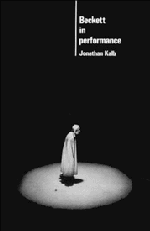Book contents
- Frontmatter
- Contents
- List of illustrations
- Acknowledgments
- 1 Introduction
- PART ONE Acting
- PART TWO Directing
- 5 Underground staging in perspective
- 6 Eh Joe, Dis Joe, He Joe: toward a television icon
- 7 The gamble of staging prose fiction
- 8 Conclusion: the question of context
- PART THREE Conversations
- Notes
- Bibliography
- Index
8 - Conclusion: the question of context
Published online by Cambridge University Press: 01 June 2011
- Frontmatter
- Contents
- List of illustrations
- Acknowledgments
- 1 Introduction
- PART ONE Acting
- PART TWO Directing
- 5 Underground staging in perspective
- 6 Eh Joe, Dis Joe, He Joe: toward a television icon
- 7 The gamble of staging prose fiction
- 8 Conclusion: the question of context
- PART THREE Conversations
- Notes
- Bibliography
- Index
Summary
When critics speak of Beckett's cultural context they usually mean his place in literary history, the great museum of classic authors T. S. Eliot called “tradition.” In the mountain of commentary discussing Beckett's indebtedness to Descartes, Proust, Joyce, his affinities with Sartre, Kafka, Camus, and his stylistic influence on Pinter, Albee, Handke and countless other younger authors, we find little that clearly distinguishes theater from drama, or drama from literature in general, and still less that situates him specifically in theatrical history.
After all, one of the main preoccupations of theater in this century has been the gradual displacement of the Author, so how can we insure his canonical position without considering him as a purely literary figure? The fact is, though, that Beckett's playwriting distinguishes itself from most other dramatic literature to a large extent because of its effects in production, its demands on those acting, directing and watching it. Though the author's directing has had almost no influence, his drama, far from subsisting chiefly on library shelves, has continued to influence new ideas about performance and has in fact insinuated itself into the best work of the contemporary avant-garde – a process sufficiently advanced for Herbert Blau to suggest that Beckett is the logical starting point for historical discussion of any significant new work, “the locus classicus of the problematic of the future.”
But the question of Beckett's context is complicated for other reasons than this literary/theatrical question.
- Type
- Chapter
- Information
- Beckett in Performance , pp. 144 - 162Publisher: Cambridge University PressPrint publication year: 1989



